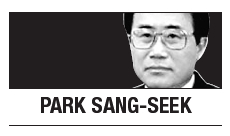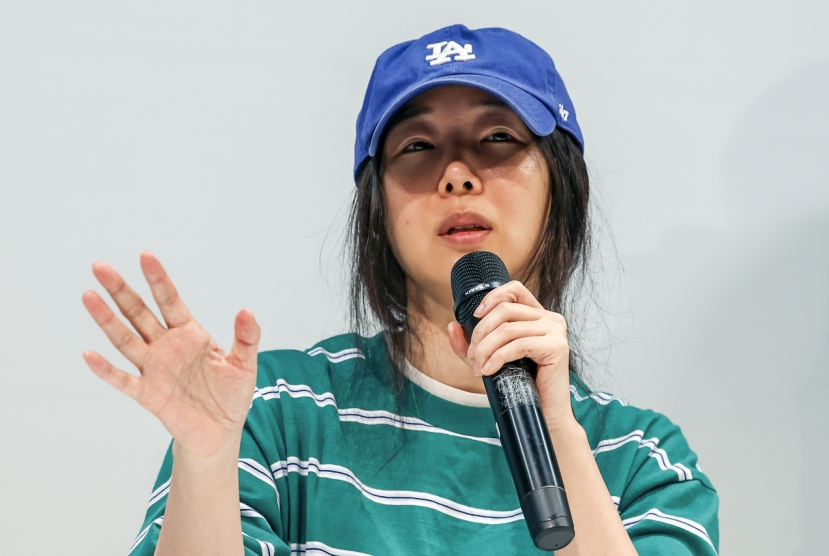Most conservative leaders and mass media in South Korea say that Koreans live well but are not appreciative of it, and they live in a very serious security environment but are not aware of it. On the other hand, most progressive leaders and mass media claim that a majority of people are not well-off because the wealth disparity is wider than ever and that South Koreans live in a serious security environment because the past conservative governments failed to ameliorate the situation.
 These perceptional differences have been transformed into political creeds and have become the ideological foundations of the respective political parties and social organizations.
These perceptional differences have been transformed into political creeds and have become the ideological foundations of the respective political parties and social organizations.
What does economic well-being mean to the Korean people? A majority of Koreans know that they are better off than people in developing countries and are wealthier than in any time in their history, but they are not so happy. According to an OECD survey (2012) the suicide rate in South Korea is highest among all OECD members.
Two factors can be responsible for their unhappiness. One is income disparity. But South Korea’s income disparity is lower than those of China, Japan, Russia and the United States. Koreans are not aware of this fact or do not care about it even if they know about it.
Another factor is relative deprivation. Koreans are more concerned about their relative poverty compared to other Koreans, not their absolute poverty, and become frustrated, particularly when they find that the wealth disparity is increasing. Paradoxically, people feel more unhappy when they find they are less well-off than others, particularly when they think that these others have amassed wealth unjustly, than when they are absolutely poor.
According to a recent survey, the middle class population has decreased and the lower class has increased, while the upper class has become richer. Under the circumstances, Koreans’ feeling of relative deprivation is bound to intensify. This is the reason why most Koreans do not appreciate economic well-being.
South Koreans are aware of the security threat from North Korea but do not pay much attention to it. If an ordinary Korean is asked if North Korea will invade the South or collapse very soon, she will say “I don’t know,” “I have not thought about it” or “I have been too preoccupied with my personal life to think about it.” But she is sure that her life will go on as it has been.
Why does she have such an attitude? One explanation is that in the back of her mind, she has the belief that South Korea is militarily stronger than North Korea, and that the U.S. military forces guarantee peace and security on the Korean Peninsula. Ordinary Koreans do not fear North Korea’s nuclear weapons because they trust the U.S.’ extended deterrence.
Another explanation is that a majority of South Koreans, particularly those who did not experience the Korean War, think that although North Korea has made all kinds of provocations against the South during their lifetime, it has never launched a massive military attack. Therefore, there is no reason why people should be too worried about it.
Some people are also fed up with the “boy crying wolf” propagated by the past dictatorial governments. Conservatives, rejecting this cry-wolf theory, claim that the progressives have greatly contributed to the popular apathy toward the security threat.
In order to solve the happiness issue and the security apathy issue, both conservatives and progressives should consider the following:
First, on the security issue, the lower-class people tend to be conservative rather than progressive, but on the socioeconomic issues they are progressive. The upper-class people are conservative and the middle-class people are generally moderate on both issues. The conservative forces should feel relieved that a majority of lower-class people are strongly anti-communist and therefore they should be more sympathetic toward the social welfare programs demanded by the lower class.
Second, the threat from North Korea is the most serious national security issue. Unfortunately, the conservative and progressive forces have been using this security issue for their political gains. The former advocate a stick policy and the latter a carrot policy.
The North Korean leadership is a black box ― an unknown entity. Therefore, South Korea cannot have one single fixed policy; it should be prepared for all possible contingencies. The unification plan is just one of them. When you are uncertain about your enemy’s true intentions, the best policy is to do neither harm nor good. The principle of reciprocity should not be treated as the golden rule.
Internally, if the conservative and progressive forces try to use their North Korea strategies for domestic political purposes, they both will ruin their own country. Both can become either a new McCarthy or a new Chamberlain.
By Park Sang-seek
Park Sang-seek is a former rector of the Graduate Institute of Peace Studies, Kyung Hee University, and the author of “Globalized Korea and Localized Globe.” ― Ed.
 These perceptional differences have been transformed into political creeds and have become the ideological foundations of the respective political parties and social organizations.
These perceptional differences have been transformed into political creeds and have become the ideological foundations of the respective political parties and social organizations.What does economic well-being mean to the Korean people? A majority of Koreans know that they are better off than people in developing countries and are wealthier than in any time in their history, but they are not so happy. According to an OECD survey (2012) the suicide rate in South Korea is highest among all OECD members.
Two factors can be responsible for their unhappiness. One is income disparity. But South Korea’s income disparity is lower than those of China, Japan, Russia and the United States. Koreans are not aware of this fact or do not care about it even if they know about it.
Another factor is relative deprivation. Koreans are more concerned about their relative poverty compared to other Koreans, not their absolute poverty, and become frustrated, particularly when they find that the wealth disparity is increasing. Paradoxically, people feel more unhappy when they find they are less well-off than others, particularly when they think that these others have amassed wealth unjustly, than when they are absolutely poor.
According to a recent survey, the middle class population has decreased and the lower class has increased, while the upper class has become richer. Under the circumstances, Koreans’ feeling of relative deprivation is bound to intensify. This is the reason why most Koreans do not appreciate economic well-being.
South Koreans are aware of the security threat from North Korea but do not pay much attention to it. If an ordinary Korean is asked if North Korea will invade the South or collapse very soon, she will say “I don’t know,” “I have not thought about it” or “I have been too preoccupied with my personal life to think about it.” But she is sure that her life will go on as it has been.
Why does she have such an attitude? One explanation is that in the back of her mind, she has the belief that South Korea is militarily stronger than North Korea, and that the U.S. military forces guarantee peace and security on the Korean Peninsula. Ordinary Koreans do not fear North Korea’s nuclear weapons because they trust the U.S.’ extended deterrence.
Another explanation is that a majority of South Koreans, particularly those who did not experience the Korean War, think that although North Korea has made all kinds of provocations against the South during their lifetime, it has never launched a massive military attack. Therefore, there is no reason why people should be too worried about it.
Some people are also fed up with the “boy crying wolf” propagated by the past dictatorial governments. Conservatives, rejecting this cry-wolf theory, claim that the progressives have greatly contributed to the popular apathy toward the security threat.
In order to solve the happiness issue and the security apathy issue, both conservatives and progressives should consider the following:
First, on the security issue, the lower-class people tend to be conservative rather than progressive, but on the socioeconomic issues they are progressive. The upper-class people are conservative and the middle-class people are generally moderate on both issues. The conservative forces should feel relieved that a majority of lower-class people are strongly anti-communist and therefore they should be more sympathetic toward the social welfare programs demanded by the lower class.
Second, the threat from North Korea is the most serious national security issue. Unfortunately, the conservative and progressive forces have been using this security issue for their political gains. The former advocate a stick policy and the latter a carrot policy.
The North Korean leadership is a black box ― an unknown entity. Therefore, South Korea cannot have one single fixed policy; it should be prepared for all possible contingencies. The unification plan is just one of them. When you are uncertain about your enemy’s true intentions, the best policy is to do neither harm nor good. The principle of reciprocity should not be treated as the golden rule.
Internally, if the conservative and progressive forces try to use their North Korea strategies for domestic political purposes, they both will ruin their own country. Both can become either a new McCarthy or a new Chamberlain.
By Park Sang-seek
Park Sang-seek is a former rector of the Graduate Institute of Peace Studies, Kyung Hee University, and the author of “Globalized Korea and Localized Globe.” ― Ed.
-
Articles by Korea Herald




![[Herald Interview] 'Amid aging population, Korea to invite more young professionals from overseas'](http://res.heraldm.com/phpwas/restmb_idxmake.php?idx=644&simg=/content/image/2024/04/24/20240424050844_0.jpg&u=20240424200058)












![[KH Explains] Korean shipbuilding stocks rally: Real growth or bubble?](http://res.heraldm.com/phpwas/restmb_idxmake.php?idx=652&simg=/content/image/2024/04/25/20240425050656_0.jpg&u=)

